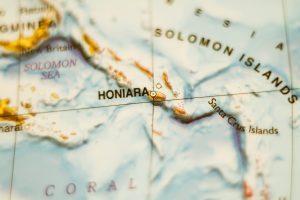Solomon Islands is currently experiencing its first major outbreak of COVID-19, and the pace at which it is spreading is frightening. Infections and deaths are skyrocketing in Honiara and other parts of Guadalcanal.
After a remarkable two years of keeping COVID-19 in check at our borders, our health workers are now bearing the brunt of the pandemic. The new Multi-Purpose Hall, which is now serving as the country’s COVID-19 Central Field Hospital, is overflowing with COVID patients and people who are asymptomatic are being asked to isolate at home.
I am recovering from COVID-19, and many I know have also been struck down by the virus.
One of our best protections is still to get vaccinated. We know vaccination is still the best line of defense against COVID-19. Vaccinations must be scaled up. As infections rise, we are seeing more people needing a bed in hospital and we are losing more lives by the hour.
Solomon Islands has one of the lowest vaccination rates in Asia and the Pacific. Fewer than 11 percent of our eligible population have received two doses of vaccine.
Recent modeling from the Lowy Institute indicates that we will be one of the last countries in the world to reach high levels of vaccination, along with our neighbors Papua New Guinea and Vanuatu.
There are two reasons why I think the vaccination rates are low in the country.
First and foremost, people are still reluctant to get the jab because of misinformation circulating on the internet. Rumors spread faster than the virus could ever travel. Second, vaccines are yet to reach most remote communities due to immense logistical challenges across our island nation.
Our biggest challenge lies ahead. A timely supply of doses and proper planning must be accompanied by information about the importance of getting those jabs into as many arms as possible.
There is an urgent need to build vaccine confidence and correct rumors. A survey conducted by the National Democratic Institute last year found that less than half of the adult population would be willing to have the vaccine when it was available in their community.
The research found that widespread rumors were driving vaccine hesitancy. Misinformation needs to be addressed to build vaccine confidence. We must listen to people’s concerns. We are seeing attitudes change. Red Cross teams are going door-to-door with information across urban and remote communities, but much more work is needed.
Information campaigns need to be better resourced to ensure that everyone in Solomon Islands has the opportunity to talk through any vaccine concerns.
The evidence is clear: Vaccines help protect us from being infected with COVID-19 and mean much less risk of being hospitalized or dying.
We also need to make this vaccine accessible to people in the most remote islands, mountains, and valleys, not just in the towns. Much more needs to be done to get these vaccines across to our remote communities.
We can learn from other countries in the Pacific on how to achieve this. In Fiji, for example, health staff have successfully provided COVID-19 vaccines on their most remote islands.
With the emergence of new variants including Omicron, this pandemic is far from over for small island nations like ours. There will be more waves of this virus. Without a fair supply, adequate distribution, and rapid uptake of vaccines, it’s a pipe dream to even imagine a post COVID-19 recovery.
For people in Solomon Islands, recovery is critical. Although our strong border restrictions and public health measures have kept us safe until now, they have also kept us isolated, resulting in devastating social and economic impacts for families already struggling.
Low vaccination rates are prolonging the impacts on small business, local markets, and driving up poverty. A successful vaccine rollout will result in huge health, social, and economic benefits for our people and other neighboring island nations.
A recent report by the International Federation of Red Cross and Red Crescent Societies highlights that a global and equitable vaccination program is critical for countries to begin their socioeconomic recovery.
The current cyclone season also brings greater danger of COVID-19 spreading even faster. The 2021 World Risk Index named Solomon Islands as having one of the highest risks of disasters globally. The race to vaccinate the world is by no means over and the last thing we want is to have virus running rampant when a cyclone hits.
Cyclones in the Pacific are intensifying and becoming more frequent as we witnessed with massive storms Cyclone Harold and Cyclone Winston, which wrought havoc across Fiji in recent years.
We have just seen how after the recent volcanic eruption and tsunami in Tonga, the country lost its COVID-free status when infections were detected in people unloading relief items. The vaccines are the best shot we have to protect our people against COVID-19 as we battle this current wave and impending cyclones.
We must trust and respect out frontline health workers and volunteers, who risk their lives to help others every day. Our hospitals and health system are facing their biggest challenge from COVID-19 and we all need to play our part in helping keep people safe.
If we want Solomon Islanders to have a safe future, our people must embrace vaccinations everywhere, on all islands, from the coast to the mountains and the valleys.
































